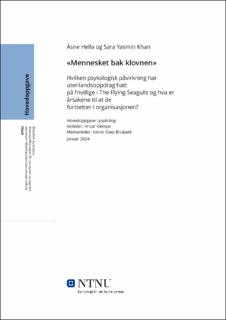| dc.contributor.advisor | Klempe, Hroar | |
| dc.contributor.advisor | Brubakk, Katrin Glatz | |
| dc.contributor.author | Hella, Åsne | |
| dc.contributor.author | Khan, Sara Yasmin | |
| dc.date.accessioned | 2024-04-11T17:19:29Z | |
| dc.date.available | 2024-04-11T17:19:29Z | |
| dc.date.issued | 2024 | |
| dc.identifier | no.ntnu:inspera:155555788:36309332 | |
| dc.identifier.uri | https://hdl.handle.net/11250/3126176 | |
| dc.description.abstract | Antallet flyktninger i verden har økt de siste årene, og flyktningkrisen er blant vår tids største utfordringer. Tidligere forskning viser at frivillig arbeid med mennesker som har opplevd traumatiske hendelser og lever i belastende kår kan ha både positive og negative virkninger. Til tross for dette foreligger det lite forskning på frivillige innenfor underholdningsbransjen. Denne kvalitative studien undersøker hvilken psykologisk påvirkning utenlandsoppdrag har hatt på de frivillige klovnene i organisasjonen The Flying Seagulls (TFS), samt årsakene til at de fortsetter i organisasjonen. TFS sin filosofi går ut på at ethvert barn har rett til lek og latter, uavhengig av livssituasjon og hvor i verden de bor. Det ble gjennomført semistrukturerte intervjuer med åtte frivillige i organisasjonen. Basert på intervjuene ble fire tema avdekket: betydningen av mestringsstrategier for å takle moralsk stress, fremmedgjøring og endret verdisyn, opplevelse av meningsfullhet, og organisatorisk- og kollegial støtte. Resultatene tyder på at de frivillige opplever at utenlandsoppdragene har både positive og negative psykologiske virkninger. Opplevelsen av meningsfullhet er særlig viktig, men også organisatorisk og kollegial støtte bidrar til opprettholdt deltakelse. På motsatt side er opplevelsen av moralsk stress og hjemkomsten fra oppdrag særlig utfordrende. Klovnerollen medfører både styrker og begrensninger i det humanitære arbeidet. Den positive psykologiske påvirkningen av arbeidet ser ut til å være større enn den negative påvirkningen. | |
| dc.description.abstract | The number of refugees in the world has increased in recent years, and the refugee crisis is among the greatest challenges of our time. Previous research shows that voluntary work with people who have experienced traumatic events and live in stressful environments can have both positive and negative effects. Despite this, there is a knowledge gap in the literature regarding volunteers within the entertainment industry. This qualitative study examines the psychological impact overseas missions have had on the clown volunteers in the organization The Flying Seagulls (TFS), as well as the reasons why they continue in the organization. TFS's philosophy is that every child has the right to play and laugh, regardless of their life-situation and where in the world they live. Semi-structured interviews were conducted with eight volunteers within the organization. Based on the interviews, four themes were revealed: the importance of coping strategies for managing moral stress, alienation and altered values, experience of meaningfulness, and organizational and collegial support. The results indicate that the overseas missions have both positive and negative psychological effects on the volunteers. The experience of meaningfulness is of particular importance, but organizational and collegial support also contribute to sustained participation. On the other hand, the experience of moral stress and the difficulties associated with returning home from assignments are particularly challenging. The role of the clown has both strengths and limitations in the humanitarian work. The positive psychological impact of the work seems to be greater than the negative impact. | |
| dc.language | nob | |
| dc.publisher | NTNU | |
| dc.title | «Mennesket bak klovnen». Hvilken psykologisk påvirkning har utenlandsoppdrag hatt på frivillige i The Flying Seagulls og hva er årsakene til at de fortsetter i organisasjonen? | |
| dc.type | Master thesis | |
